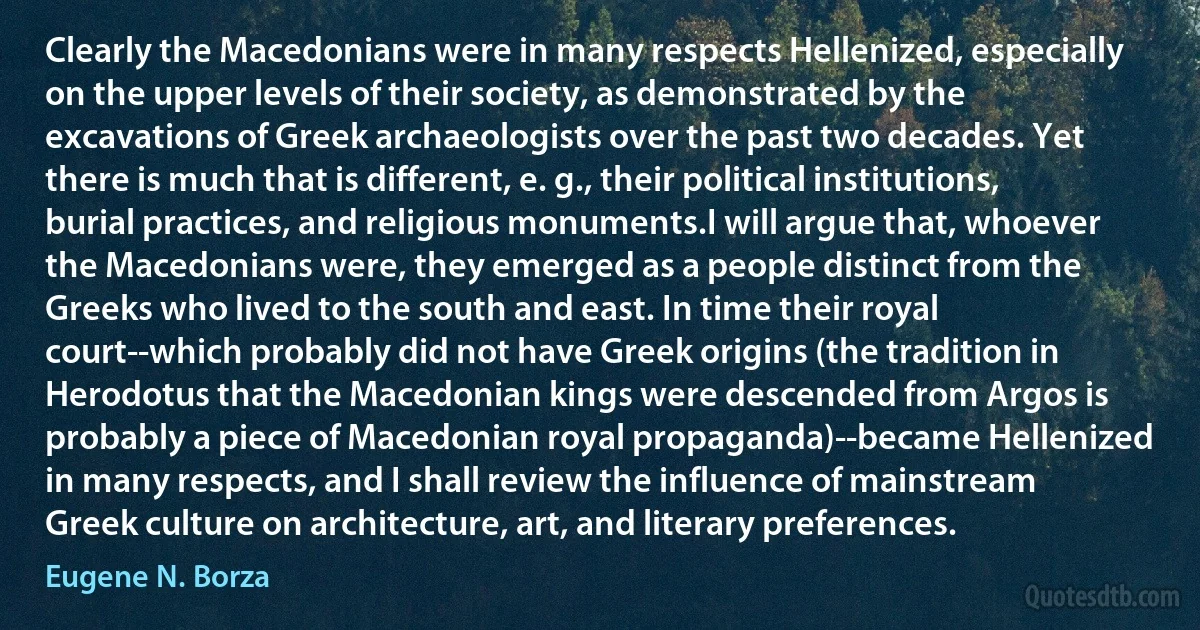Eugene N. Borza quotes
It is difficult to know whether an independent Macedonian state would have come into existence had Tito not recognised and supported the development of Macedonian ethnicity as oart of his ethnically organised Yugoslavia. He did this as a counter to Bulgaria, which for centuries had a historical claim on the area as far west as Lake Ohrid and the present border of Albania.

Eugene N. Borza
The Macedonians are a newly emergent people in search of a past to help legitimize their precarious present as they attempt to establish their singular identity in a Slavic world dominated historically by Serbs and Bulgarians. One need understand only a single geopolitical fact: As one measures conflicting Serb and Bulgarian claims over the past nine centuries, they intersect in Macedonia. Macedonia is where the historical Serb thrust to the south and the historical thrust to the west meet. This is not to say that present Serb and Bulgarian ambitions, where the past has precedence over the present and future.

Eugene N. Borza
There is no doubt that this tradition of a superimposed Greek house was widely believed by the Macedonians[...] There was a persistent, well attested tradition in antiquity that told of a group of Greeks from Argos -descendants of Temenus, kinsman of Heracles- who came to Macedonia and established their rule over the Makedones, unifying them and providing a royal house.

Eugene N. Borza
Who were the Macedonians? As an ethnic question it is the best avoided, since the mainly modern political overtones tend to obscure the fact that it really is not a very important issue. That they may or may not have been Greek in whole or in a part--while an interesting anthropological sidelight--is really not crucial to our understanding of their history. They made their mark not as a tribe of Greeks or other Balkan peoples, but as Macedonians. This was understood by foreign protagonists from the time of Darius and Xerxes to the age of Roman generals.

Eugene N. Borza
Here we have seen that their early history is still largely an open question. They may have had Greek origins: Whatever process produced the Greek-speakers (of that is how one defines "Greek") who lived south of Olympus may have also produced the Makedones who wandered out of the western mountains to establish a home and a kingdom in Pieria.

Eugene N. Borza
Only recently have we begun to clarify these muddy waters by revealing the Demosthenean corpus for what it is: oratory designed to sway public opinion and thereby to formulate public policy. That elusive creature, Truth, is everywhere subordinate to Rhetoric; Demosthenes' pronouncements are no more the true history of the period than are the public statements of politicians in any age.

Eugene N. Borza
Their daughter, who would be the half-sister of Alexander the Great and, later the wife of Cassander, was appropriately named Thessalonike, to commemorate Philip's victory in Thessaly. In 315 Cassander founded at or near the site of ancient Therme the great city that still bears her name.

Eugene N. Borza
Movie critics have complained that the movie lacks coherent vision. The fault may not be Stone's. We know what [Alexander] did, and it continues to astonish us, but we don't know how or why he did it... Stone suggests some noble purpose for Alexander's mad, bloody tromp across Asia. He and his historical consultant shared a need to give meaning to a meaningless conquest.

Eugene N. Borza
![There is no reason to deny the Macedonians' own traditions about their early kings and the migration of the Macedones[.. ] The basic story as provided by Herodotus and Thucydides, minus the interpolation of the Temenid connections, undoubtedly reflects the Macedonians' own traditions about their early history. (Eugene N. Borza)](https://cdn.quotesdtb.com/img/quotes_images_webp/74/eugene-n-borza-basic-265274.webp)

